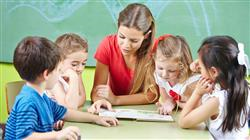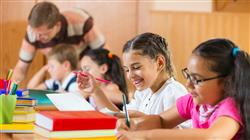University certificate
The world's largest school of languages”
Introduction to the Program
This Postgraduate certificate in The Organization of a Bilingual Center will give you a sense of confidence in the performance of your profession, which will help you to grow both personally and professionally"

Governments across Europe have set out to encourage the learning of foreign languages from the very beginning of schooling, and numerous bilingual education projects have sprung up in recent years.
In order to carry out these projects, designing an appropriate methodology for teaching foreign languages in early childhood education is of vital importance. One of the main characteristics of bilingual education should be the coordination between language and content teaching, since young children tend to learn in a holistic way.
This new reality is an enormous challenge for teachers, who find their teaching work has become more complicated.
Update your knowledge through the Postgraduate certificate in Organization of a Bilingual Center"
This Postgraduate certificate in The Organization of a Bilingual Center contains the most complete and up-to-date scientific program on the market. The most important features of the course are:
- Work on over 75 cases presented by experts in bilingual early childhood education. The graphic, schematic, and eminently practical contents with which they are created provide scientific and practical information on the disciplines that are essential for professional practice
- Innovations in methodology and application in bilingual early childhood education
- It contains practical exercises where the self-evaluation process can be carried out to improve learning
- Interactive learning system based on making decisions about the situations posed
- All of this will be complemented by theoretical lessons, questions to the expert, debate forums on controversial topics, and individual reflection assignments
- Content that is accessible from any fixed or portable device with an Internet connection
This Postgraduate certificate may be the best investment you can make in the selection of an updating program for two reasons: in addition to updating your knowledge in the organization of a bilingual center, you will obtain a Postgraduate certificate from TECH Global University"
Its teaching staff includes professionals from the field of organization of a bilingual center, who bring to this training the experience from their work, as well as recognized specialists belonging to reference societies and prestigious universities.
The multimedia content developed with the latest educational technology will provide the professional with situated and contextual learning, i.e., a simulated environment that will provide immersive training program to train in real situations.
The design of this program is based on problem-based learning, by means of which the educator must try to solve the different professional practice situations that arise throughout the Postgraduate certificate To this end, the professional will be assisted by an innovative interactive video system developed by recognized experts in the field of bilingual school organization, with extensive teaching experience.
Increase your decision-making confidence by updating your knowledge through this Postgraduate certificate"

Make the most of this opportunity to learn about the latest advances in the organization of a bilingual center and improve the attention to your students"
Why study at TECH?
TECH is the world’s largest online university. With an impressive catalog of more than 14,000 university programs available in 11 languages, it is positioned as a leader in employability, with a 99% job placement rate. In addition, it relies on an enormous faculty of more than 6,000 professors of the highest international renown.

Study at the world's largest online university and guarantee your professional success. The future starts at TECH”
The world’s best online university according to FORBES
The prestigious Forbes magazine, specialized in business and finance, has highlighted TECH as “the world's best online university” This is what they have recently stated in an article in their digital edition in which they echo the success story of this institution, “thanks to the academic offer it provides, the selection of its teaching staff, and an innovative learning method aimed at educating the professionals of the future”
A revolutionary study method, a cutting-edge faculty and a practical focus: the key to TECH's success.
The most complete study plans on the university scene
TECH offers the most complete study plans on the university scene, with syllabuses that cover fundamental concepts and, at the same time, the main scientific advances in their specific scientific areas. In addition, these programs are continuously being updated to guarantee students the academic vanguard and the most in-demand professional skills. In this way, the university's qualifications provide its graduates with a significant advantage to propel their careers to success.
TECH offers the most comprehensive and intensive study plans on the current university scene.
A world-class teaching staff
TECH's teaching staff is made up of more than 6,000 professors with the highest international recognition. Professors, researchers and top executives of multinational companies, including Isaiah Covington, performance coach of the Boston Celtics; Magda Romanska, principal investigator at Harvard MetaLAB; Ignacio Wistumba, chairman of the department of translational molecular pathology at MD Anderson Cancer Center; and D.W. Pine, creative director of TIME magazine, among others.
Internationally renowned experts, specialized in different branches of Health, Technology, Communication and Business, form part of the TECH faculty.
A unique learning method
TECH is the first university to use Relearning in all its programs. It is the best online learning methodology, accredited with international teaching quality certifications, provided by prestigious educational agencies. In addition, this disruptive educational model is complemented with the “Case Method”, thereby setting up a unique online teaching strategy. Innovative teaching resources are also implemented, including detailed videos, infographics and interactive summaries.
TECH combines Relearning and the Case Method in all its university programs to guarantee excellent theoretical and practical learning, studying whenever and wherever you want.
The world's largest online university
TECH is the world’s largest online university. We are the largest educational institution, with the best and widest online educational catalog, one hundred percent online and covering the vast majority of areas of knowledge. We offer a large selection of our own degrees and accredited online undergraduate and postgraduate degrees. In total, more than 14,000 university degrees, in eleven different languages, make us the largest educational largest in the world.
TECH has the world's most extensive catalog of academic and official programs, available in more than 11 languages.
Google Premier Partner
The American technology giant has awarded TECH the Google Google Premier Partner badge. This award, which is only available to 3% of the world's companies, highlights the efficient, flexible and tailored experience that this university provides to students. The recognition as a Google Premier Partner not only accredits the maximum rigor, performance and investment in TECH's digital infrastructures, but also places this university as one of the world's leading technology companies.
Google has positioned TECH in the top 3% of the world's most important technology companies by awarding it its Google Premier Partner badge.
The official online university of the NBA
TECH is the official online university of the NBA. Thanks to our agreement with the biggest league in basketball, we offer our students exclusive university programs, as well as a wide variety of educational resources focused on the business of the league and other areas of the sports industry. Each program is made up of a uniquely designed syllabus and features exceptional guest hosts: professionals with a distinguished sports background who will offer their expertise on the most relevant topics.
TECH has been selected by the NBA, the world's top basketball league, as its official online university.
The top-rated university by its students
Students have positioned TECH as the world's top-rated university on the main review websites, with a highest rating of 4.9 out of 5, obtained from more than 1,000 reviews. These results consolidate TECH as the benchmark university institution at an international level, reflecting the excellence and positive impact of its educational model.” reflecting the excellence and positive impact of its educational model.”
TECH is the world’s top-rated university by its students.
Leaders in employability
TECH has managed to become the leading university in employability. 99% of its students obtain jobs in the academic field they have studied, within one year of completing any of the university's programs. A similar number achieve immediate career enhancement. All this thanks to a study methodology that bases its effectiveness on the acquisition of practical skills, which are absolutely necessary for professional development.
99% of TECH graduates find a job within a year of completing their studies.
Postgraduate Certificate in Organization of a Bilingual Center
In an increasingly globalized world, mastering more than one language is essential to open doors to new opportunities. If you are interested in the field of bilingual education and wish to acquire specialized knowledge in the organization of a bilingual center, the Postgraduate Certificate in Organization of a Bilingual Center from TECH Global University is the perfect option for you. And best of all, you will be able to access these online classes from anywhere and enjoy its many benefits. Our team of expert teachers in the field of bilingual education will guide you throughout the Postgraduate Certificate, providing support and sharing their expertise. You will learn the most effective strategies to foster dual language learning, create an inclusive and motivating environment, and ensure quality education in a bilingual environment.
Develop your skills in Organizing a Bilingual Center with TECH
At TECH Global University, we understand the importance of bilingual education in today's world. Our Postgraduate Certificate is designed to provide you with the theoretical and practical knowledge necessary to establish and efficiently manage a bilingual educational center. You will learn the best practices in curriculum planning, selection of didactic materials, evaluation and monitoring of student progress, among other key aspects. With our online classes, you will have the flexibility to study at your own pace and adapt your study schedule to your needs. You won't have to worry about commuting or adjusting your daily routine. In addition, you will be able to access the course materials 24 hours a day, 7 days a week, from any device with an internet connection. At the end of the Postgraduate Certificate, you will be prepared to face the challenges and take advantage of the opportunities offered by the organization of a bilingual center. You will be able to apply your knowledge in educational institutions, collaborate in the implementation of bilingual programs and contribute to the development of an excellent education. Don't miss the opportunity to enhance your career in the field of bilingual education with TECH Global University! Enroll in our Postgraduate Certificate in Organization of a Bilingual Center and become a leader in the promotion of language learning in educational environments.







